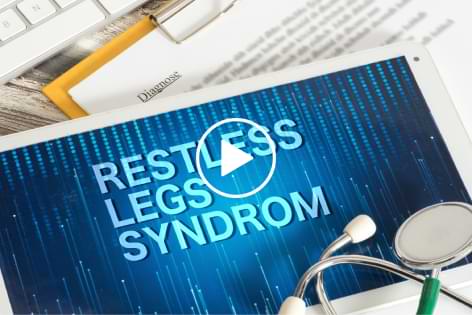
LMU 92 – Beyond the Restless Legs: Unveiling New Insights and Natural Solutions
Source: Journal Sleep and Breathing (2015)
Lifestyle Medicine Update (June 20, 2018)
Introduction
Restless Legs Syndrome (RLS), also known as Willis-Ekbom Disease, is a condition that casts a shadow over the lives of millions, causing discomfort and impairing quality of life. Its prevalence in the United States is estimated at 7-10%, possibly even reaching 15%, with a slightly higher occurrence among women. This condition presents itself through distressing sensations in the legs and an uncontrollable urge to move them. Often exacerbated during the evening and night hours, RLS disrupts sleep, leading to daytime fatigue, reduced productivity, and a host of challenges that can culminate in depression and anxiety.
Beneath the Surface: The Role of Nutrient Imbalances
While the link between low iron levels and RLS has been well-established, not all cases can be attributed to iron deficiency alone. A pivotal study published in 2015 in the journal Sleep and Breathing uncovered a less explored factor – vitamin D deficiency. This discovery opened a new avenue for understanding and managing RLS. The study demonstrated that raising blood vitamin D levels above 50nmol/L significantly alleviated RLS symptoms in individuals whose levels had been below this threshold. Such findings bear significant weight considering the potential addiction and withdrawal risks associated with commonly prescribed RLS drugs.
A Safer Alternative: Corrective Supplementation
The standard pharmaceutical treatments for RLS involve medications like Gabapentin, Benzodiazepines (e.g. Valium), and Opioids (e.g. Oxycodone). However, a more natural approach might lie in addressing the nutrient imbalances at the core of RLS. The key is accurate diagnosis – individuals with RLS should undergo assessments of both iron and vitamin D levels. If serum ferritin registers below 20ng/ml and/or vitamin D blood levels fall under 50nmol/L, targeted supplementation could be the solution. Studies suggest that this strategy holds the potential to resolve a substantial portion of RLS cases without resorting to medications with potential adverse effects.
Gut Health: A New Frontier for RLS Management
Beyond vitamin D and iron, an intriguing connection emerges between gut health and RLS. Emerging research indicates that probiotic and prebiotic supplements might hold promise for alleviating RLS symptoms. A significant proportion of RLS cases (possibly 69%) are accompanied by bacterial overgrowth, a phenomenon often observed in conditions like irritable bowel syndrome (IBS). As the gut-brain axis gains prominence in medical research, exploring the link between gut health and RLS offers a new angle for holistic intervention.
Lifestyle Choices: Navigating Triggers and Aggravators
While nutrient imbalances play a crucial role in RLS, lifestyle choices also play a part. Consuming alcohol, nicotine, and caffeine are known to exacerbate RLS symptoms and should be minimized or avoided by those affected. Moreover, RLS can be connected to other health conditions, including end-stage renal disease, neuropathy, and the use of specific medications. Pregnancy, particularly in the last trimester, can also trigger RLS symptoms, though they usually abate within four weeks after delivery.
Taking Control of RLS
For those grappling with RLS, a multi-faceted approach to management is crucial. Beyond the conventional treatment avenues, the following steps can pave the way to relief:
- Assess Nutrient Levels: If you are experiencing RLS, it’s imperative to consult your healthcare provider for thorough iron and vitamin D assessments. Correcting deficiencies through supplementation, under medical guidance, can be transformative.
- Mind Gut Health: Recognize the potential link between gut health and RLS. Considering probiotic and prebiotic supplements may be a wise step, especially if bacterial overgrowth is suspected.
- Lifestyle Choices: Limit alcohol, nicotine, and caffeine intake to minimize the impact of triggers. These substances can exacerbate RLS symptoms and hinder your journey toward relief.
Conclusion
Restless Legs Syndrome is an enigmatic condition that can cast a dark cloud over an individual’s life. However, as science unveils new insights into its causes and potential solutions, a sense of hope emerges. With the discovery of the impact of vitamin D deficiency and the role of gut health in RLS, individuals now have alternative avenues for management. By addressing nutrient imbalances, making informed lifestyle choices, and exploring the gut-brain connection, RLS sufferers can reclaim their quality of life and find relief without resorting to potentially addictive medications.
References
- National Institute of Neurological Disorders and Stroke
[Link] (https://www.ninds.nih.gov/Disorders/Patient-Caregiver-Education/Fact-Sheets/Restless-Legs-Syndrome-Fact-Sheet) - Addiction and Withdrawal Side Effects of RLS Drugs:
[Link] (https://americanaddictioncenters.org/neurontin-abuse/) - IBS, Bacterial Overgrowth and Restless Leg Syndrome and Use of Probiotics:
[Link1] (https://www.ncbi.nlm.nih.gov/pubmed/2157090),
[Link2] (https://www.ncbi.nlm.nih.gov/pubmed/21381407),
[Link3] (https://www.ncbi.nlm.nih.gov/pubmed/25244414) - Vitamin D Supplementation Improves RSL: Wali S, Shukr A, Boudal A, et al. The effect of vitamin D supplements on the severity of restless leg syndrome. Sleep Breath. Vol 2:579-83. 2015
[Link] (https://www.ncbi.nlm.nih.gov/pubmed/25148866) - Iron Supplementation Improves RLS Wang J, O’Reilly, Venkataramen R et al. Efficacy of oral iron in patients with restless leg syndrome and low-normal ferritin: A randomized, double-blind, placebo-controlled study. Sleep Med. Vol 9:973-5. 2009.
[Link] (https://www.ncbi.nlm.nih.gov/pubmed/19230757)
Eat Smart, Live Well, Look Great,
Dr. Meschino

Dr. James Meschino
ABOUT THE AUTHOR
Dr. James Meschino, DC, MS, ROHP, is an educator, author, and researcher having lectured to thousands of healthcare professionals across North America. He holds a Master’s Degree in Science with specialties in human nutrition and biology and is recognized as an expert in the field of nutrition, anti-aging, fitness, and wellness as well as the author of numerous books.


